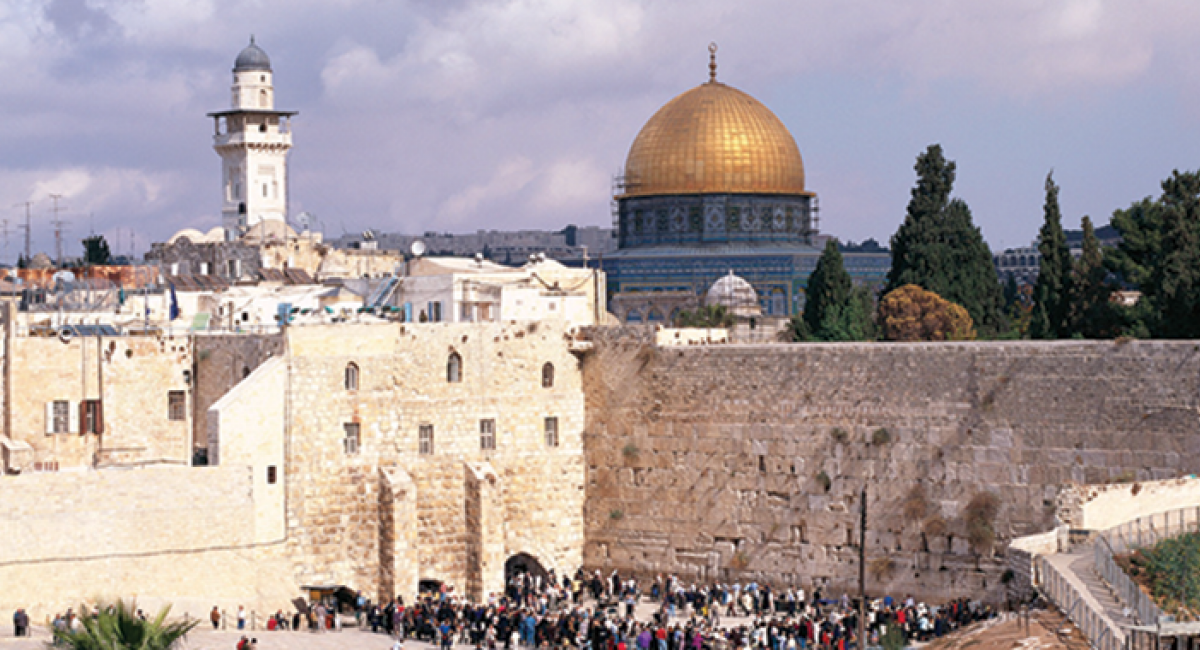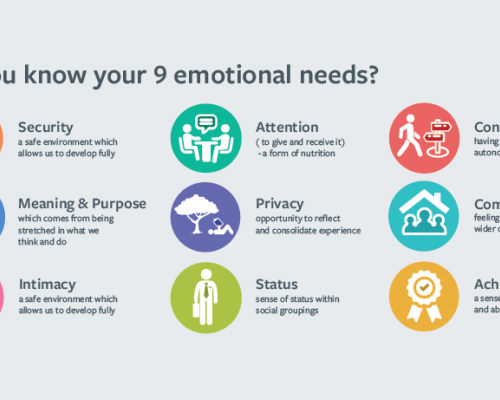Common ground: diplomacy and the human givens
John Bell suggests that only a radically different, innate needs-based approach to conflict resolution can bring a possibility of peace to the Middle East.
DIPLOMATIC intervention seems, in this day and age, to be less and less effective as an instrument of managing frictions and conflicts between states. This is particularly so in the Middle East, where venture after diplomatic venture has failed; indeed, they have possibly even exacerbated the troubles there.
At its core, the Middle East conflict speaks to the ancient human need to protect against outside threat. The irony is that the methods the region has developed to do so now propagate those threats by blurring the need for security with other unidentified essential needs, no longer meeting any of them clearly and, as a result, exacerbating problems with outsiders. If diplomacy is to offer any useful answers, it needs a fresh approach and a clear understanding of human needs, how they manifest and how to meet them.
Classic diplomacy is fundamentally based on the notion of state interest. It is a tradition that arose and thrived, from Metternich to Kissinger, as European nation states developed and solidified: professional statesmen were mandated with the mission of managing their nation's interest through dialogue, negotiation and treaty. The premise behind it is that state interests are consciously rational. That is, 'professionals' or elites could determine what was beneficial for their state, pursue this through rational means and so achieve equilibrium states with other nations, often called 'peace'. This approach matured during the European Enlightenment, a period marked by its appeal to 'reason' as the saving grace of humanity. A few 'wise men' full of reason, fundamentally disconnected from their fellow citizens, decided the fates of millions. This was successful in some periods, such as the Congress of Vienna in the 19th century, and unsuccessful in others, the First World War being a case in point. Conflict resolution and 'diplomacy' remain to this day the realm of 'the few' operating under the premise that reasoned argument and negotiation among 'the few' can lead nation-states to greener pastures and end war and disputes.
It may be, however, that the problems between nations today are so complex, and so misunderstood, that such 'rational' procedures don't have a chance to resolve longstanding or deeply rooted conflicts. We are in an age where unknown factors and the apparently 'irrational' may be playing into decision making at the international political level more than is accepted or recognised. Much money is thrown at diplomatic efforts and much authority vested in individuals, often with little result. Indeed diplomats, and professionals in conflict resolution, of whom I am one, may be at risk of being charged with professional incompetence and social irresponsibility.
My own experience as both a UN and Canadian diplomat and now the Middle East director of a global conflict resolution organisation, called Search for Common Ground, is that new 'starting points' are necessary in order for this field to deliver the goods and bring peace and stability to long-suffering peoples. The area of my knowledge, the Middle East, is simultaneously the most intractable of conflict, yet also the most telling of how wrong humans can go. Its excesses speak loudest to our failures and to a 'missing piece' in the equation.
A few years ago, along with some former colleagues in the Canadian Foreign Service, I began a project on the lodestone of the Middle East problem, the Old City of Jerusalem. This is where the Temple Mount, or the Haram Al-Sharif, is found, a space holy to both Jews and Muslims, as well as Christianity's Church of the Holy Sepulchre. In 2000, the Camp David talks failed partly because of a focus on the sovereignty of the space (what belongs to whom). As a result, we decided to pursue a new 'needs-based approach' to the problem: identifying the needs of all parties interested in the Old City and how they could be met. At the very time the Old City project began, a close friend directed me to a book called Human Givens: a new approach to emotional health and clear thinking. The similarities between the practical approach we had set upon and the paradigm in this book were obvious; the parallel between the individual and the collective level clear: if humans did not have their innate needs met in a society, conflict would inevitably ensue, just as mental illness would ensue, in an individual.
In the Middle East, needs are not being met because decision-making systems do not address or even recognise them, and often intentionally and wilfully ignore them. This certainly leads to poor decisions, because a possible set of answers are not factored in. The inherited systems of organisation, such as tribe, nation, religious identity, even centralised government or ideology, that bind groups and motivate behaviours limit responses and conflate needs into a blur that is not easily disentangled. Human needs in the Middle East are so confused, through the admixture of religion, traditional politics and belonging, that no one can distinguish what their needs actually are — or the way forward. Furthermore, collective unrecognised and unmet needs, whether for security, autonomy, or meaning, can lead to things going very awry.
In the Middle East region, religious heritage plays an especial role: it provides simultaneously a reason for pride, an instrument to bond the group for the purpose of survival, as well as, theoretically, a mechanism for pursuing greater meaning and purpose in life. The result is intermingled needs which, together with archaic instruments for managing modern problems, create a sure-fire recipe for conflict. So, in the Middle East, we have people clinging to land that others have, rationalising behaviour through ancient scripture, and sticking to political answers that have no evidence of efficacy. Attempts at new solutions or understanding matters anew often result in outright disbelief by adherents or the risk of attack or censure.
Disaggregating needs
Over millennia, the people of the Middle East have learned to rely, for their identity, on belonging, particularly to a religious community, thus enabling them also to pursue meaning (especially through the collective pursuit of the 'divine' and meet needs for survival and security (as in "I live or die by my group"). In actual fact, these dimensions need to be disaggregated and understood as separate, in order for needs to be met practically, in this day and age.
It is because of this deep conflation of needs that the Middle East 'feels' existential to any one who works intimately with it. The parties appear to be uncompromising and will apparently throw away seemingly sensible deals, or roads leading to them, such as at Camp David in 2000, because, in the end, the sacrifices involved threaten these essential needs all at once or at least appear to. Arab Muslims today feel they cannot compromise because their heritage and survival is threatened and at stake. Jews, too, hold on dearly to all they have nurtured through the millennia as life-vests of the spirit and body.
Testing each side's readiness to compromise is volatile exactly because any step touches on the most basic and existential parts of each group's identity. Conflict is certain and conflict resolution almost impossible because the society does not believe it can violate what it holds most dear in the name of compromise. Belonging and its fruits matter too much.
This 'existential' attitude towards heritage and identity can be recognised in extremis in the almost suicidal tendency, on both sides, to fight. Within the space of one week in Jerusalem, I was told by an Israeli and a Palestinian that they were ready to let their children die and their futures disappear because they 'had nothing to lose' and all about them was threat. The Middle East has a track record of radical suicidal behaviour, from the siege of the fortress at Masada in AD72, when nearly 1000 Jews sacrificed themselves rather than submit to the Romans, through the revolt in the 2nd century ad against the Romans by Jewish rebel bar Kochba and his followers, also ending in mass suicide in the same fortress, to the suicide bomb attacks of Palestinians of recent years. This latent tendency, currently exhibited by a few radicals, may be more intrinsic to the region's habits than may first meet the eye. It is also demonstrated in the regular failure of negotiations on core issues because they are 'core' to the very existence of the peoples of the region: rather go to the wall and fail than compromise.
Indeed, for thousands of years, the organising principles of tight belonging to family, tribe and religion made sense. The Middle East is the grand pathway of invasion: Europe, Africa and Asia meet here and many a bold conqueror swept through the Fertile Crescent, annihilating locals in his path. From Alexander the Great, to Babylonian king Nebuchadnezzar to British General Allenby, the path of conquest between Cairo and Antioch has been well trodden. 'Tight belonging' was essential under such conditions; there was simply no other way to survive.
What the people of the Middle East seem to have discovered, however, is that combining this need for belonging and survival with religious beliefs and ideals cemented the group more firmly. The identity becomes 'jetfuelled' by faith, uncompromising, idealised, full of the glory of meaning, while simultaneously assuaging the anxiety of survival. It is a cultural emotional cocktail that is not easy to give up. Indeed, sometimes it produces a strength of purpose and will that takes a defensive principlebelonging and transforms it into successful offence: thus the Arab Muslim expansion of the 7th and 8th centuries or the Zionist success in establishing a state in the 20th century.
This may even seem a relatively efficient way to achieve societal goals. In actual fact, it is dangerous because of the basic attitude it engenders: exclusivity to the group becomes essential for survival. The very principle that provides life and meaning excludes, and harshly so, for the group's integrity cannot be threatened. This intermingling of the needs for survival, meaning and belonging leads naturally to conflict, both because of the aggressive exclusion and because, in the end, the conflation is not an efficient means to meet those needs. Exclusivity spontaneously generates conflict because it often denies the needs of others and survival is threatened by the very mechanism that is supposed to maintain it; the pursuit of 'greater meaning' is confused with other needs such as the need for survival and identity and thus is largely unachieved; and, while belonging is indeed achieved, at what cost does it come and could it not be achieved in a less risky way?
An example of this dynamic in today's Middle East politics is the Israeli settlement enterprise in the West Bank and Gaza, which derives out of a scriptural reference to land that ancient Jews were divinely granted and which is now 'settled' by modern Jews. The land is needed for both survival of the Jewish people (an extension of the idea of Israel as a haven) and the pursuit of meaning in the sense of fulfilling a divine mission. Until relatively recently, few Israelis questioned the settlement enterprise even though it was built on the land of an existing population group, the Palestinians. For various reasons, that activity has now been diminished in the name of a more important definition of 'belonging': the maintenance of the cohesion of Israel as a Jewish state. The effects of this enterprise nevertheless remain consequential: in its current plans, Israel will still keep ownership of the large settlement blocs, and compromises made to settlers who are removed may include the dangerous step of holding on to disputed core parts of Jerusalem.
State-level intervention and 'classic' diplomacy cannot fight against such embedded and misunderstood needs. The 'old school' will inevitably lose because it cannot see the 'ghost' it is battling with. As long as needs are left unattended and unidentified and are not disaggregated into modules that can be looked at individually, negotiations will not be able to resolve these problems. The old diplomat is simply blind in the face of such complexities and entanglements it is no wonder that failure repeats itself in the attempts to find peace. The Middle East needs new organising ideas in order to shake this unholy plague of traditional forms of belonging, and new mechanisms to meet its difficult realities head on.
Forward thinking
The Old City of Jerusalem encompasses many of the complexities of the Middle East conflict security, religious needs and symbolism, and demographic and property interests in one square kilometre. The Old City project is attempting to find new answers to this old conflict by disaggregating needs, and presenting new concepts of governance based on meeting the needs of all parties within this small but volatile space.
The project set about identifying and explaining needs, from 'sewage to symbolism'. The city's history adds to its richness and its problems are many. Belonging, survival and security are interwoven in its daily fabric, in the practices of its residents, the claims of nations and the symbolic and emotive perceptions of billions around the globe. Property registries have not been kept since Ottoman times and even then in a haphazard manner; attacks on the holy sites by extremists represent a constant threat; millions of Christian, Muslim and Jewish tourists and pilgrims come every year to visit and enjoy the city's sites and spectacular location but also create congestion and competing interests, sometimes over the same locale. Above all, the question of who controls the space remains one of the thorniest political problems on the planet. Israel occupied the Old City in 1967 and has remained in control until today with many practical and political consequences for Palestinians as well as many other groups with a stake in it.
A discussion document, The Jerusalem Old City Initiative,[2] was prepared by the Canadian team, of which I am a member, outlining everyone's needs and defining possible structures and arrangements that could lead to needs being met.[2] These include social, propertyownership, economic, political and religious, symbolic and heritage needs. Projects and research, from a comprehensive survey of housing stock and structure for the purpose of renovation and rehabilitation, to joint Palestinian Israeli planning on improving visitor services and minimising current equities in tourism, to the development of a 'common charter' that recognises respective needs are proposed in the text.
The core suggestion, a frame of governance that would involve Israelis, Palestinians and internationals in the administration of the Old City, addresses the need for control. A tripartite governing council is proposed with an appointed administrator, agreed to by all parties and the international community. We wanted to avoid the division presented in other proposals such as the Geneva Accords. Instead, the aim is to maintain the integrity of the Old City, both from a functional point of view (the space is too small and crowded to be broken up) and from the more visionary perspective of maintaining its historical nature as one walled city and a place for future understanding and pluralism.
A single Old City police force, again composed of Israelis, Palestinians and internationals, is also suggested as the most efficacious instrument of achieving security in this most sensitive of locales. Critically, there would be, through these arrangements, freedom of access for worship for all believers as well as recognition of the historical links of all interested parties to the disputed areas. Today, many Palestinian Muslims and Christians cannot access the holy sites in Jerusalem due to Israeli security measures, restrictions on movement and the construction of the barrier around Jerusalem. In contrast, Jewish historical ties to the Temple Mount and other holy sites are often denied by Palestinians and other Arabs and Muslims, creating great distrust. The Old City initiative aims to create structures that meet such needs directly, and calm sources of friction and conflict. For example, the proposed Old City police force would permit secure access to all worshippers, and the governing council would play a role in recognising the links of all communities to their holy sites and heritage.
Through this process, the needs for belonging (participation in governance), meaning (freedom of worship) and survival (security) in the Old City are defined, and addressed practically, without large sacrifices; instead, the pie is 'enlarged' by the introduction of the international dimension, while maintaining the national interests of Palestinians and Israelis. The proposed arrangements meet these needs without using old paradigms of exclusivity.
The Old City project has been proceeding at pace for two years but it still meets many hurdles. Although the project provides some degree of meeting the needs for control, the desire for exclusive control, nurtured by millennia of conflation of needs as described above, still interferes with this more sensible approach, thwarting compromise.
For instance:
- The level of distrust between Israelis and Palestinians remains very high due to half a century of conflict and this tends to cause rejection of any effort for accommodation, including creative ones;
- Old habits of diplomacy and politics die hard, even if they don't work;
- Many leaders are partaking in 'circles of attention' as opposed to 'circles of solution'. This makes them focus on existing plans and over-rides the drive for creative solutions that might require moving against the crowd: peer pressure keeps everyone dumbed down and lacking in daring;
- Above all, needs remain unidentified or insufficiently explained. The desire for many Jews to hold on to the Temple Mount and the counter Muslim claim on the same space is lived as unquestioned desire, rather than as a series of specific and achievable needs such as freedom of access, recognition of historical links, security, and shared authority over the site.
Our current goal is to continue to pursue the core needs, especially security, by further developing arrangements so that they are practical and meaningful to all concerned. The project is certainly against today's political climate; however, its strength remains that it is trying to address the core problems and needs and as such will ultimately be effective in conflict prevention, if implemented.
One possible road that has not been tried is to have the parties first come to an understanding of the basic needs of each side before starting negotiations. But, alas, the needs-based approach is almost too basic for leaders and policymakers and takes away from the much-loved complexity that drives the political world and its sister, the media.
The Old City project will proceed and, on its way, graft some new approaches on to the ongoing political dynamics but my sense is that we have barely begun. The ability to attract new people, especially decision and opinion makers, to these approaches will require proof of effect on the ground. Furthermore, it is likely that two issues will need to be addressed more directly for the Middle East to begin to leave its quandary.
1. Liberation from restraints:
New thinking is required regarding the twin pursuits of survival and meaning. The region continues to proceed, using antiquated means of achieving these needs, and is unwilling to consider a revamping of these processes. This 'unpacking' inevitably means some large reforms regarding religious understanding and relationships with those outside the faith. At a basic level, this means that people begin to consider that 'identities' of belonging are tools in the hands of people, to shape for themselves, and evolve as required at each time in history, and not permanent forms to be adapted to. This is a large step in a region where identities cut to the root of existence but a desirable goal may, in the end, be a more flexible understanding of identity that is more inclusive.
2. Integration a region for all:
The Old City has four distinct quarters (Muslim, Christian, Jewish, and Armenian); it has conflicting property claims over houses and shops between Jews and Arabs, disputed holy sites such as the Temple Mount and Haram Al-Sharif, and it is crowded: one square kilometre of tight alleyways, souks, Mameluke, Crusader and Ottoman buildings housing 35,000 people, and dozens of heritage sites. With such disputes, density and diversity, it is a microcosm of the region. Answers like those proposed in the Old City project are new organising principles because they are based on maintaining integrity of the space while still meeting the needs of the diversity of citizens. If implemented, these could serve as a model for the region at large.
Although it is merely a vision now, a Middle East confederation (composed, for example, of Israel, Lebanon, Syria, Palestine and Jordan) could achieve greater integrity between these small states, easing mobility and recreating natural connections destroyed by war and the nation-state and facilitating economic success. A confederation, as opposed to empire or autocracy, would be a configuration that would permit interconnection, while maintaining local decentralisation.Above all, such a concept would permit the people of the region to tackle many of their problems, from refugees to water needs, on a regional basis possibly the only way they will be resolved.
In the end, the exclusivity that Middle East identity has bred for thousands of years may simply not be as necessary as it seemed; the peoples of the region may simply be more similar to each other than their cultures would have them believe. Musk oxen gather in a circle to defend against wolves, yet, outside the circle, there may only be other oxen.
This article first appeared in "Human Givens Journal" Volume 13 - No. 2: 2006
 We need your help – this article originally appeared in the Human Givens Journal which takes no advertising at all, in order to maintain its editorial independence.
We need your help – this article originally appeared in the Human Givens Journal which takes no advertising at all, in order to maintain its editorial independence.
To survive it needs new readers and subscribers – if you have found the articles, case histories and interviews on this website helpful, and would like to support the human givens approach – please take out a subscription or buy a back issue today.
References
- Bell, M, Molloy, M, J, Bell, J and Evans, M (2005) The Jerusalem Old City Initiative - discussion document: new directions for deliberation and dialogue. University of Toronto, Munk Centre for International Studies.
- This document also served as the basis for discussion on Jeruselum by Israeli, Palestinian and international experts at a workshop in Istanbul in December 2005.
Latest Tweets:
Tweets by humangivensLatest News:
HG practitioner participates in global congress
HG practitioner Felicity Jaffrey, who lives and works in Egypt, received the extraordinary honour of being invited to speak at Egypt’s hugely prestigious Global Congress on Population, Health and Human Development (PHDC24) in Cairo in October.
SCoPEd - latest update
The six SCoPEd partners have published their latest update on the important work currently underway with regards to the SCoPEd framework implementation, governance and impact assessment.
Date posted: 14/02/2024













